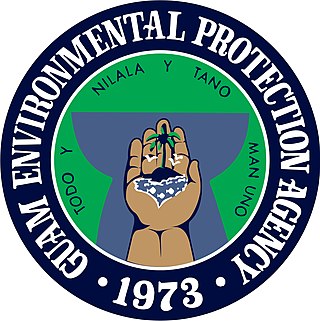
Environmental laws are laws that protect the environment. Environmental law is the collection of laws, regulations, agreements and common law that governs how humans interact with their environment. This includes environmental regulations; laws governing management of natural resources, such as forests, minerals, or fisheries; and related topics such as environmental impact assessments. Environmental law is seen as the body of laws concerned with the protection of living things from the harm that human activity may immediately or eventually cause to them or their species, either directly or to the media and the habits on which they depend.

Industrial waste is the waste produced by industrial activity which includes any material that is rendered useless during a manufacturing process such as that of factories, mills, and mining operations. Types of industrial waste include dirt and gravel, masonry and concrete, scrap metal, oil, solvents, chemicals, scrap lumber, even vegetable matter from restaurants. Industrial waste may be solid, semi-solid or liquid in form. It may be hazardous waste or non-hazardous waste. Industrial waste may pollute the nearby soil or adjacent water bodies, and can contaminate groundwater, lakes, streams, rivers or coastal waters. Industrial waste is often mixed into municipal waste, making accurate assessments difficult. An estimate for the US goes as high as 7.6 billion tons of industrial waste produced annually, as of 2017. Most countries have enacted legislation to deal with the problem of industrial waste, but strictness and compliance regimes vary. Enforcement is always an issue.

In environmental law, the polluter pays principle is enacted to make the party responsible for producing pollution responsible for paying for the damage done to the natural environment. This principle has also been used to put the costs of pollution prevention on the polluter. It is regarded as a regional custom because of the strong support it has received in most Organisation for Economic Co-operation and Development (OECD) and European Union countries, and has a strong scientific basis in economics. It is a fundamental principle in US environmental law.

Environmental Protection Department (EPD) is a department of Hong Kong Government concerning the issues of environmental protection in Hong Kong.The EPD is responsible for developing policies covering environmental protection, nature conservation; enforcing environmental legislation; monitoring environmental quality; providing collection, transfer, treatment and disposal facilities for many types of waste; advising on the environmental implications of town planning and new policies; handling pollution complaints and incidents; and raising awareness and support in the community for environmental initiatives.

The Environmental Protection Act 1990 is an Act of the Parliament of the United Kingdom that as of 2008 defines, within England and Wales and Scotland, the fundamental structure and authority for waste management and control of emissions into the environment.

The Waste Management Licensing Regulations 1994 formerly applied in Great Britain to those persons involved in the collection, storage, treatment and disposal of controlled wastes. The regulations dictate the licensing of persons or businesses involved in the management of waste and relate directly to the licensing of a site or activity to carry out the management, processing and disposal of wastes. These activities were previously covered by provisions contained within the Control of Pollution Act 1974 (COPA). The regulations implement certain provisions of European Directive 91/156/EEC and are enacted under the Environmental Protection Act 1990.
Title 40 is a part of the United States Code of Federal Regulations. Title 40 arranges mainly environmental regulations that were promulgated by the US Environmental Protection Agency (EPA), based on the provisions of United States laws. Parts of the regulation may be updated annually on July 1.

In the United States, several federal agencies and laws have some jurisdiction over pollution from ships in U.S. waters. States and local government agencies also have responsibilities for ship-related pollution in some situations.

There are multiple environmental issues in India. Air pollution, water pollution, garbage, domestically prohibited goods and pollution of the natural environment are all challenges for India. Nature is also causing some drastic effects on India. The situation was worse between 1947 through 1995. According to data collected and environmental assessments studied by World Bank experts, between 1995 through 2010, India has made some of the fastest progress in addressing its environmental issues and improving its environmental quality in the world. However, pollution still remains a major challenge and opportunity for the country.

Biomedical waste or hospital waste is any kind of waste containing infectious materials generated during the treatment of humans or animals as well as during research involving biologics. It may also include waste associated with the generation of biomedical waste that visually appears to be of medical or laboratory origin, as well research laboratory waste containing biomolecules or organisms that are mainly restricted from environmental release. As detailed below, discarded sharps are considered biomedical waste whether they are contaminated or not, due to the possibility of being contaminated with blood and their propensity to cause injury when not properly contained and disposed. Biomedical waste is a type of biowaste.

The Guam Environmental Protection Agency is a government agency of the United States territory of Guam.
Solid waste policy in the United States is aimed at developing and implementing proper mechanisms to effectively manage solid waste. For solid waste policy to be effective, inputs should come from stakeholders, including citizens, businesses, community-based organizations, non-governmental organizations, government agencies, universities, and other research organizations. These inputs form the basis of policy frameworks that influence solid waste management decisions. In the United States, the Environmental Protection Agency (EPA) regulates household, industrial, manufacturing, and commercial solid and hazardous wastes under the 1976 Resource Conservation and Recovery Act (RCRA). Effective solid waste management is a cooperative effort involving federal, state, regional, and local entities. Thus, the RCRA's Solid Waste program section D encourages the environmental departments of each state to develop comprehensive plans to manage nonhazardous industrial and municipal solid waste.

The Central Pollution Control Board (CPCB) of India is a statutory organization under the Ministry of Environment, Forest and Climate Change (Mo.E.F.C.C.). It was established in 1974 under the Water Act, 1974. The CPCB is also entrusted with the powers and functions under the Air Act, 1981. It serves as a field formation and also provides technical services to the Ministry of Environment and Forests under the provisions of the Environment (Protection) Act, 1986. It coordinates the activities of the State Pollution Control Boards by providing technical assistance and guidance and also resolves disputes among them. It is the apex organization in country in the field of pollution control, as a technical wing of MoEFCC. The board is led by its chairperson appointed by the Appointments Committee of the Cabinet of the Government of India. The current acting chairman is Shri Tanmay Kumar IAS and the Member Secretary is Bharat Kumar Sharma.

Environment Protection Act, 1986 is an Act of the Parliament of India. It was enacted in May 1986 and came into force on 19 November 1986. It has 26 sections and 4 chapters. The Act is widely considered to have been a response to the Bhopal gas leak. The Act was passed by the Government of India under the Article 253 of the Constitution of India, which empowers to union government to enact laws to give effect to international agreements signed by the country. The purpose of the Act is to implement the decisions of the United Nations Conference on the Human Environment. They relate to the protection and improvement of the human environment and the prevention of hazards to human beings, other living creatures, plants and property. The Act is an “umbrella” legislation that has provided a framework for the environmental regulation regime in India, which covers all major industrial and infrastructure activities and prohibits and regulates specific activities in coastal areas and eco-sensitive areas. The Act also provides for coordination of the activities of various central and state authorities established under other environment-related laws, such as the Water Act and the Air Act.

The Telangana Pollution Control Board (TGPCB) is a ministry of Government of Telangana. It operates under the Department of Health and Family Welfare, Government of the State of Telangana, India. The board is tasked with enforcing laws related to environmental protection.
Water in Arkansas is an important issue encompassing the conservation, protection, management, distribution and use of the water resource in the state. Arkansas contains a mixture of groundwater and surface water, with a variety of state and federal agencies responsible for the regulation of the water resource. In accordance with agency rules, state, and federal law, the state's water treatment facilities utilize engineering, chemistry, science and technology to treat raw water from the environment to potable water standards and distribute it through water mains to homes, farms, business and industrial customers. Following use, wastewater is collected in collection and conveyance systems, decentralized sewer systems or septic tanks and treated in accordance with regulations at publicly owned treatment works (POTWs) before being discharged to the environment.
Indian environmental law concerns the law and policy of India concerning the protection of the environment, measures taken to reverse climate change and achieve a zero carbon economy.

The Ministry of Environment is a ministry of the Government of Maharashtra. The ministry is responsible for promoting environmental issues in Maharashtra.

New Jersey Water Pollution Control Law consists of legislative and regulatory measures intended to limit the amount of harmful substances found in the state's lakes, rivers, and groundwater. In New Jersey, the federal Clean Water Act and the state Water Pollution Control Act are the most significant pieces of water pollution control legislation. These laws are implemented and enforced by the New Jersey Department of Environmental Protection (NJDEP).













